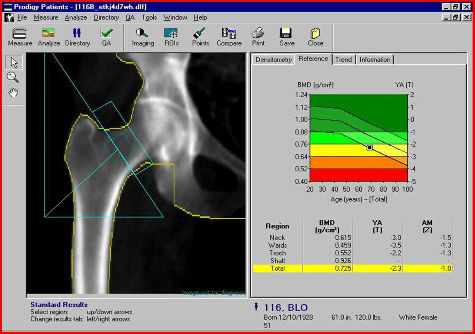 New research from the University of Texas Medical Branch at Galveston finds that nearly half of women using depot medroxyprogesterone acetate (DMPA), commonly known as the birth control shot, will experience high bone mineral density (BMD) loss in the hip or lower spine within two years of beginning the contraceptive. Women who smoke, have inadequate calcium intake, and have never given birth are at higher risk of BMD loss.
New research from the University of Texas Medical Branch at Galveston finds that nearly half of women using depot medroxyprogesterone acetate (DMPA), commonly known as the birth control shot, will experience high bone mineral density (BMD) loss in the hip or lower spine within two years of beginning the contraceptive. Women who smoke, have inadequate calcium intake, and have never given birth are at higher risk of BMD loss.
The study, published in the January 2010 issue of Obstetrics and Gynecology, followed 95 DMPA users for two years. In that time, 45 women had at least five percent BMD loss in the lower back or hip. A total of 50 women had less than five percent bone loss at both sites during the same period. The researchers followed 27 of the women for an additional year and found that those who experienced significant BMD loss in the first two years continued to lose bone mass.
“These losses, especially among women using DMPA for many years, are likely to take an extended period of time to reverse,” says first author Dr. Mahburbur Rahman, assistant professor in the department of obstetrics and gynecology and Center for Interdisciplinary Research in Women’s Health.
The researchers note that while this study will help physicians counsel women with modifiable risk factors who wish to use DMPA, prevention of bone loss while using the contraceptive and reversibility of BMD loss are still not well understood and further research is needed.
DMPA, an injected contraceptive given every three months, is used by more than two million women in the U.S.; nearly one-quarter of them teens. DMPA is popular with young women because it is less expensive than many other forms of birth control, has a low failure rate, and does not require daily use.
[Via Red Tent Sisters]


Depo-Provera is an insidious drug that not only causes bone density loss but many, many other troubling side effects, including loss of sex drive, which for teenagers seems a particularly ironic side effect. Just as you start the exploration of your sexuality, you take a drug that gives you the hormonal profile of a menopausal women, thus interrupting your psycho-sexual development. That nearly one-quarter of Depo-Provera users are teenagers is depressing and heartbreaking to me. I consider the provision of this drug to teenagers, especially 14 to 16 year olds, a form of child abuse. There is absolutely no way that informed consent to take this drug is possible by a 14 or 15 year old girl. Oh, and by the way, not only are teens losing bone density, but they face double jeopardy with this drug. They are losing bone density at a time when they are supposed to be building bone density – for a net loss that should cause the gravest concern for all Depo users, their parents and their health care providers. This is a clear example of where the end (unplanned pregnancy prevention) does not justify the means (Depo-Provera. If we (sexual and reproductive health educators and care providers of which I am one) can’t come up with better ways than Depo-Provera to help teenage girls (and young adult women) prevent unplanned pregnancy then we just aren’t trying hard enough.